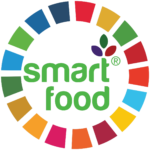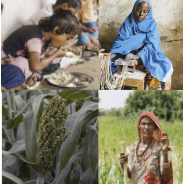

Publish your Smart Food Research Paper
Call for research and opinion pieces providing insights to food system
solution understanding the components and especially the nexus of
being Good for you, the planet and the farmer.

Research Topic
Smart Food for Healthy, Sustainable and Resilient Food Systems
Participating Journals
-
Frontiers in Sustainable Food Systems
-
Frontiers in Nutrition
Submission Deadlines
| 2 March 2021 | Abstract |
| 16 June 2021 | Manuscript |
Background
Topic Editors

Honorary Fellow,
ICRISAT, Italy

Sr. Scientist,
ICRISAT, India

Regional Director WCA
ICRISAT, Mali

Co-director,
Ostrom Center, Thailand

University of Reading
United Kingdom

Food, Agriculture and Natural Resources Policy Analysis Network (FANRPAN)
Pretoria, South Africa
Scope
Submitted manuscripts may include Original Research, Systematic Reviews, Reviews, and Perspective papers that address issues across the value chain from farmers to consumers – including research into the adaptation of various crops to climate change, farmer acceptance and profitability of various crops, nutrition and environmental sustainability of food crops, processing impacts on the nutrition of food, consumer awareness of healthy food, changing consumer behavior towards food, and other obstacles which potentially deter farmers from growing more diverse and smart foods.
The mission of the Specialty – Frontiers in Nutrition and Sustainable Diet is to publish original research and review papers addressing the complex interplay of environmental sustainability and human nutrition. Evidence-based policy decisions are critical in health, agriculture and the environment in order to provide sustainable solutions to sectoral problems. However, when these sectors address issues independently, the end result is often collateral damage in the other sectors. In order to sustainably achieve international targets and goals in nutrition, all three sectors need to interact. One hypothesis is that nutrition-driven agriculture within environmental limits can provide the solution to many global problems simultaneously. However, the evidence base is weak and more and better research is required.
Useful perspectives can be found in the domains of sustainable diets and food systems, biodiversity for food and nutrition, food/nutrient losses and waste, environmental impacts of agricultural production and consumption linked to nutrients and nutritional outcomes. The research dimensions may include any of the following:
• Environmental impact studies: analyses of water, land, GHG emissions, agro-chemical use, etc., associated with production of diets, foods and individual nutrients for human nutrition;
• Policy reviews: assessment of global, regional, national or sectoral policy papers and that have real or potential benefits or risks for nutrition and environmental sustainability;
• Food/nutrient losses and waste: assessment of natural resource pressures or environmental impacts due to losses and waste from farm through consumption;
• Impacts, trade-offs and consequences of dietary transitions, current and future demands;
• Environmental sustainability and human health/wellbeing;
• Food composition: analyses of nutrients, bioactive non-nutrients, and contaminants in food biodiversity (varieties, cultivars, breeds; or neglected and underutilized species);
• Dietary intakes / food consumption: studies characterizing agro-ecological zones for delivery of nutrients for human nutrition, or individual or household intakes of agricultural or industrial contaminants via the food supply;
• Diets, foods and nutrients for human nutrition as ecosystem services;
• Hunger, food insecurity, undernutrition as natural resource and environmental issues;
• Overweight, obesity, metabolic syndrome, and other diet-related chronic diseases as environmental issues;
• Impacts and costs of foods and whole diets for delivery of nutrients vs supplements, fortificants, therapeutic formulations;
• Interventions and case studies
• Qualitative and quantitative methods and indicators: development, validation, and analyses.
The scope of the Specialty will evolve as new ideas and assessment techniques emerge.
Publishing Fees
Frontiers, as a Gold Open Access publisher, offsets all the costs associated with high-quality publishing service through Article Processing Charges (APCs): articles that are accepted for publication by external editors following rigorous peer review incur a publishing fee charged to authors, institutions or funders.
| Article Processing Charges by Journal | ||||
| Journal | A Type Articles | B Type Articles | C Type Articles | D Type Articles |
| Frontiers in Nutrition | US$ 2,490 | US$ 1,150 | US$ 450 | Free |
| Frontiers in Sustainable Food Systems | US$ 950 | US$ 700 | US$ 450 | Free |
A-Type Articles: Clinical Trial, Hypothesis & Theory, Methods, Original Research, Policy and Practice Reviews, Review, Systematic Review, Study Protocol, Technology and Code, Registered Report
B-Type Articles: Brief Research Report, Case Report, Community Case Study, Conceptual Analysis, Curriculum Instruction and Pedagogy, Mini Review, Perspective, Policy Brief
C-Type Articles: Data Report, General Commentary, Opinion
D-Type Articles: Book Review, Core Concept (Young Minds), Correction, Editorial, Field Grand Challenge, New Discovery (Young Minds), Specialty Grand Challenge.
Fee support for authors
Frontier provides for assistance to those authors unable to pay publication fees.
For more details, visit – https://www.frontiersin.org/about/publishing-fees
Support for authors from Francophone Countries
On sucessful acceptance, the editors will provide suitable guidance for scientists from francophone countries for translation by subject matter expert for further improvement of the manuscript.
Important Note: All contributions to this Research Topic must be within the scope of the section and journal to which they are submitted, as defined in their mission statements. Frontiers reserves the right to guide an out-of-scope manuscript to a more suitable section or journal at any stage of peer review.
Contacts
| Application Support | For assistance with technical issues Your requests including your personal details will transit through a US-based service provider. |
support@frontiersin.org |
| Editorial Office | For general comments, suggestions, or queries | editorial.office@frontiersin.org |
| For queries about specific manuscripts in review, or queries related to submitting to a Journal or Research Topics, please contact the relevant journal directly. | ||
| For Chinese-language 中文 author service. | china@frontiersin.org |
